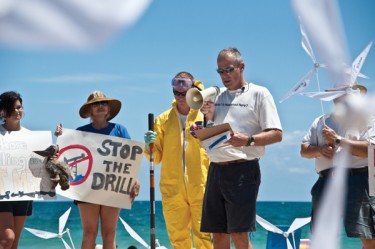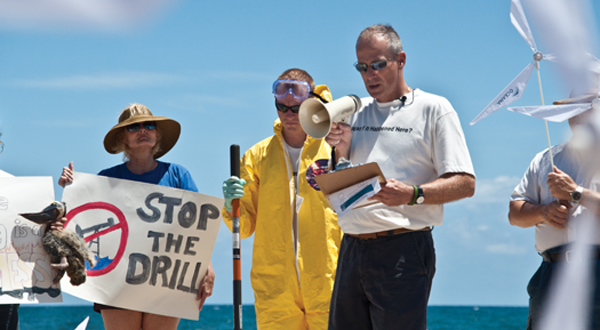
The Deepwater Horizon oil spill left 200 million gallons of petroleum in the Gulf of Mexico, 11 dead, 12,000 jobless and 400 species of marine wildlife in danger.
Now imagine this scenario in South Florida.
One year after the spill, a group of South Floridians opposed to offshore drilling have raised concerns that petroleum companies will move to drill off the coast of Florida.
On Wednesday, oceans advocacy non-profit group Oceana hosted a mock oil spill on Las Olas Boulevard in Ft. Lauderdale. At the rally, the group protested against large oil corporations and petitioned for renewable energy solutions.
“We know with certainty that where there is drilling, there is spilling,” said Katie Parrish, climate and energy campaign organizer for Oceana. “What will help Florida’s economy and energy dependence is focusing on renewable sources of energy, such as offshore wind.”
The group proposed an amendment to the Florida constitution in order to prohibit “oil drilling for exploration or extraction” in all Florida waters.
Oceana, however, has nothing to worry about for at least six years. Last December, the Obama administration reversed its decision to explore drilling on Florida’s coastline, according to The Miami Herald.
The new policy mandates that Florida’s Atlantic coastline and the eastern Gulf of Mexico will remain closed to drilling until at least 2017.
“As a result of the Deepwater Horizon oil spill we learned a number of lessons, most importantly that we need to proceed with caution and focus on creating a more stringent regulatory regime,’’ U.S. Secretary of the Interior Ken Salazar told the Herald.
In January, after the federal investigation of the oil spill, former Florida Senator Daniel “Bob” Graham, co-chairman of the president’s commission on the spill, said the damage in the Gulf last summer proved that the current no-drilling buffer zone around Florida should be maintained.
“I don’t believe that anybody can say categorically that any set of recommendations, if totally adopted, would give us zero risk that this would occur again,” he said to the Herald. “It’s an inherently risky industry. It’s the nature of the beast. What we can do is reduce the probability of it occurring.”
Still, there are those who rally to keep Floridians aware that there is always a threat of legislators changing their minds.
“For the sake of our grandchildren, we have to come out and make people aware of what the government is doing,” said protester Vicki Rider on Wednesday at the Oceana event. Rider is a member of the South Florida chapter of Raging Grannies, an organization of peaceful female activists. “We’re here by choice because we’d like to see our oceans remain.”
Alexandra Leon may be contacted at aleon@themiamihurricane.com.






